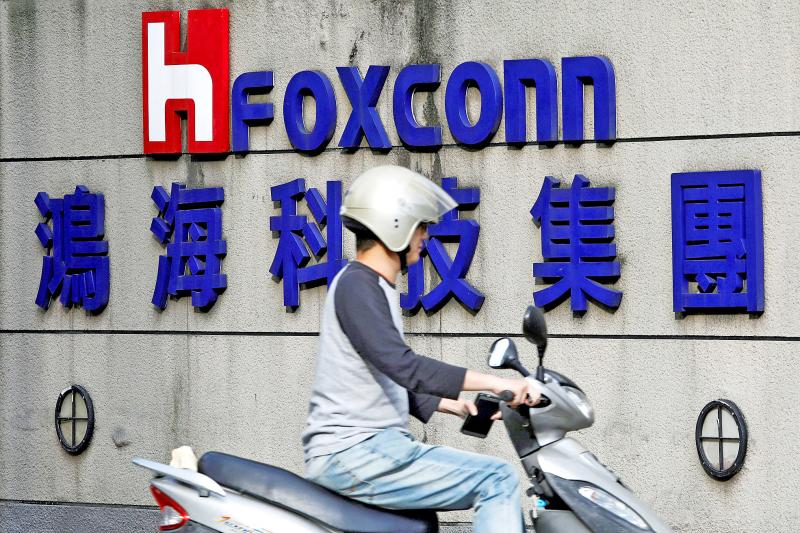Hon Hai Precision Industry Co (鴻海精密), Apple Inc’s leading iPhone assembler, yesterday reported that first-quarter net profit plunged 89.49 percent from a year earlier to NT$2.08 billion (US$69.45 million) amid the fallout from the COVID-19 pandemic.
This translated into earnings per share of NT$0.15, its lowest quarterly figure since the financial crisis of 2008.
Blaming dwindling market demand as well as production disruptions in China, which accounts for about 70 percent of its operations, Hon Hai posted heavy operating expenses of NT$37.29 billion, including NT$10 billion in epidemic prevention costs.

Photo: Tyrone Siu, Reuters
Gross margin slid to 4.5 percent last quarter from 5.53 percent in the same period last year. Operating margin dipped to 0.49 percent from 1.53 percent a year earlier.
Revenue fell 12 percent year-on-year to NT$929.13 billion.
A shipment breakdown showed that consumer products made up 42.1 percent of total sales, enterprise products 27.4 percent, computing products 23.7 percent and components the remainder.
With the global economic outlook turning dim because of the pandemic and dampening smartphone demand, Hon Hai forecast a single-digit annual decline in sales for this quarter, including a 15 percent annual drop for its consumer products segment.
“We are, however, seeing a rise in demand for our other segments, as consumers adopt a new lifestyle as they [increasingly] work from home,” Hon Hai chairman Young Liu (劉揚偉) told investors during a teleconference.
The company’s enterprise products and components segments are each expected to post a 10 percent annual increase in sales this quarter, while computing products sales are forecast to grow by 15 percent.
Second-quarter gross margin is likely to return to previous levels, Liu added, while reaffirming Hon Hai’s goal to raise gross margin to 10 percent by 2025.
While Hon Hai’s production plants across China are up and running, its India plants are to remain closed until Sunday because of a govenrment-imposed lockdown, Liu said, adding that operations in Mexico are likewise suspended due to regulations.
Asked about potential relocation plans, following reports that Taiwan Semiconductor Manufacturing Co (TSMC, 台積電) is building a plant in the US, Liu said it would first and foremost be based on clients’ wishes.
“We have no specific requests from our customers for now... It is very unlikely that we would move our manufacturing facilities to the US as they labor-intensive,” Liu said, pointing to the heavy costs that would weigh on Hon Hai’s profitability in that scenario.
Furthermore, Liu said that the company would transform 10 percent of its facilities into “lighthouse” factories by the end of the year.
Based on digital transformation, Hon Hai is aiming to improve its bottom line by cutting down 30 to 50 percent of its factory workforce, he said.

Real estate agent and property developer JSL Construction & Development Co (愛山林) led the average compensation rankings among companies listed on the Taiwan Stock Exchange (TWSE) last year, while contract chipmaker Taiwan Semiconductor Manufacturing Co (TSMC, 台積電) finished 14th. JSL Construction paid its employees total average compensation of NT$4.78 million (US$159,701), down 13.5 percent from a year earlier, but still ahead of the most profitable listed tech giants, including TSMC, TWSE data showed. Last year, the average compensation (which includes salary, overtime, bonuses and allowances) paid by TSMC rose 21.6 percent to reach about NT$3.33 million, lifting its ranking by 10 notches

Popular vape brands such as Geek Bar might get more expensive in the US — if you can find them at all. Shipments of vapes from China to the US ground to a near halt last month from a year ago, official data showed, hit by US President Donald Trump’s tariffs and a crackdown on unauthorized e-cigarettes in the world’s biggest market for smoking alternatives. That includes Geek Bar, a brand of flavored vapes that is not authorized to sell in the US, but which had been widely available due to porous import controls. One retailer, who asked not to be named, because

SEASONAL WEAKNESS: The combined revenue of the top 10 foundries fell 5.4%, but rush orders and China’s subsidies partially offset slowing demand Taiwan Semiconductor Manufacturing Co (TSMC, 台積電) further solidified its dominance in the global wafer foundry business in the first quarter of this year, remaining far ahead of its closest rival, Samsung Electronics Co, TrendForce Corp (集邦科技) said yesterday. TSMC posted US$25.52 billion in sales in the January-to-March period, down 5 percent from the previous quarter, but its market share rose from 67.1 percent the previous quarter to 67.6 percent, TrendForce said in a report. While smartphone-related wafer shipments declined in the first quarter due to seasonal factors, solid demand for artificial intelligence (AI) and high-performance computing (HPC) devices and urgent TV-related orders

MINERAL DIPLOMACY: The Chinese commerce ministry said it approved applications for the export of rare earths in a move that could help ease US-China trade tensions Chinese Vice Premier He Lifeng (何立峰) is today to meet a US delegation for talks in the UK, Beijing announced on Saturday amid a fragile truce in the trade dispute between the two powers. He is to visit the UK from yesterday to Friday at the invitation of the British government, the Chinese Ministry of Foreign Affairs said in a statement. He and US representatives are to cochair the first meeting of the US-China economic and trade consultation mechanism, it said. US President Donald Trump on Friday announced that a new round of trade talks with China would start in London beginning today,